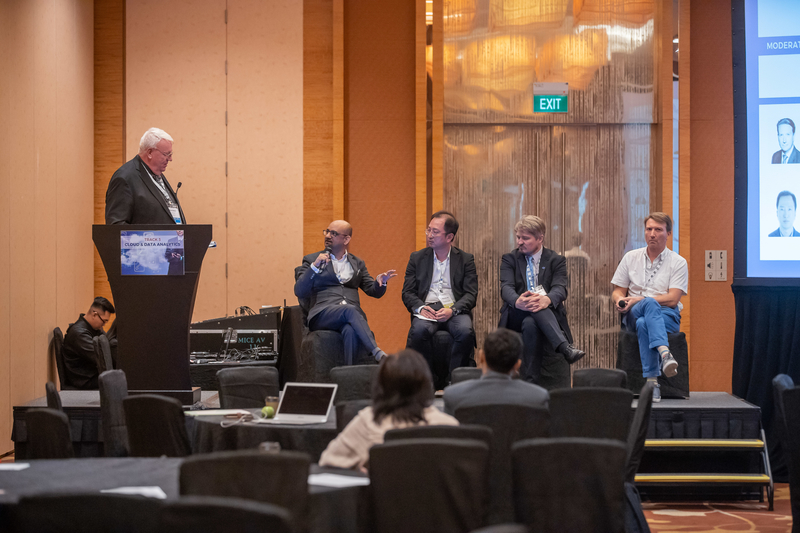
On 16th May 2019, over 500 government officials and industry leaders across the world gathered for a discussion on digital transformation in the public sector and financial services institutions (FSI). Taking place at Marina Bay Sands Singapore, this year marks the 5th Annual Singapore OpenGov Leadership Forum.
The day was filled with stimulating round-table discussions as well as innovative gamification methods, engaging panels and insightful talks by local and international leaders in public sector ICT.
The day was divided into 2 major sessions. The morning plenary had focused talks from international speakers, , four rounds of OpenGov Gamification Table (OGT) discussions and a panel. Coverage of the Keynote Presentations can be found here.
The post-plenary afternoon session had delegates separate in one of four tracks of their choosing. Coverage of Track 1, Track 2 and Track 4 can be found by clicking on the individual tracks.
Track 3: Cloud & Data Analytics
Track 3 focused on Cloud & Data Analytics. In particular, the cloud and its use to gain intelligent insights.
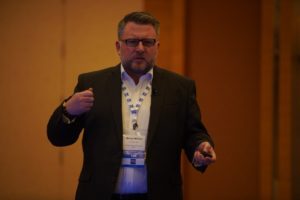
Martyn Wallace, Chief Digital Officer, Scottish Local Government Digital Office and ranked 25 in CIO100 2019, shared Scotland’s approach to design thinking.
For a successful data strategy, the first step is understanding the landscape before trying to hastily and carelessly tackle any problems.
Only after thorough research, should one move to the next step – “solutionising” – a word he has coined and trademarked.
Wallace also shared his three-pronged approach – Shape, Shift, Share – which would revolutionise and change an organisation’s data journey.
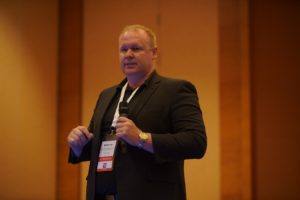
Nathan Cook, Senior Executive, National Security Innovator EMEA & JAPAC at Oracle Corporation delivered his talk on data security.
He stressed how much the online landscape has changed compared to years ago.
Further, changes are happening faster as technology improves. Thus, the need to adapt to that shift is imperative.
The simplicity of Oracle Corporation derives from the fact that it is the exact same technology on premises and in the cloud. This ensures users do not have to build and integrate the cloud – they can just use it.
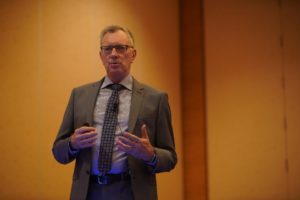
Geoff Neideck, Senior Executive, Data Strategies and IT Group at the Australian Institute of Health and Welfare, underlined the importance of public data in the Australian government.
Designing of a data strategy for a nation is a complex, comprehensive task that needs long term thinking.
Planning goes beyond technology into privacy, compliance, security and efficiencies. Executives need to understand the entire landscape and future needs when contemplating a data stratey.
Data agreements, data assets, legislation and governance are essential to creating an efficient and sophisticated infrastructure for a national data system.
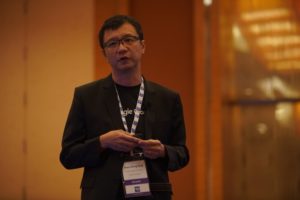
Shao-Horng Yong, Customer Engineer, Public Sector at Google Cloud Platform addressed the concern that businesses feel restricted by the cloud.
He opined that not only was cloud not restrictive but if deployed correctly, it can provide businesses with the freedom to build the best technology and stay competitive.
He emphasized the ease and consistency of a multi-cloud system. His experiences have shown that a multi-cloud approach can often take care of the challenges customers may have been facing.
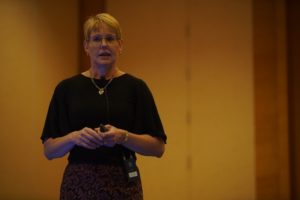
Susan Middleditch, Deputy Secretary, Corporate and Regulatory Services at Victoria Police talked about how Victorian communities can benefit from the sharing of data.
When data is shared correctly in a timely and secure fashion, it serves a range of purposes and functions.
Using good citizen-data from varied sources, the government is able to make informed decisions on policy, service-planning and design.
A good public policy, driven by data sharing and data analytics, would result in better outcomes for citizens.

Paul Serrano, Chief Evangelist APJ at Nutanix spoke on “Accelerating the Business of Enterprise – Weaponised Innovation and Technology”.
He noted that the best of both worlds could be achieved with a combination of public and private clouds. The ease of the public cloud combined with the security and control of a private cloud can be an excellent solution.
A hybrid cloud can deliver advanced networking and security services, providing visibility into the network, application-centric protection from network threats, and the automation of common networking operations.

From the Hong Kong Polytechnic University, Professor Eric Tsui underlined cloud as an intelligent knowledge centre.
He presented some of the benefits of cloud computing, including the standardisation of tools and processes as well as the lower risk and reduced latency.
He predicted that in 2020 that there will be 70 billion connected people and machines.
The disruptive capabilities of the cloud and its ability to problem solve are tremendous. None the less, he emphasises, “A cloud is not a cloud unless it’s successful!”
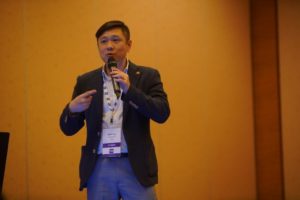
Keith Sng, Solution Engineering Manager for Southeast Asia and Korea, Veeam, discussed the importance for businesses and IT infrastructure to adapt to the newest digital disruptors.
The characteristics of data, in terms of the value, rate, and scope and location are changing.
Five parts – backup, visibility, activation, orchestration, and automation – can be looked towards to ensure that data remains protected, portable, and available, regardless of the cloud technologies and platforms they choose to adopt.
An informative panel discussion followed on the topic of “Cloud is the enabler for the Future of Analytics”. Moderated by Klaus Felsche, Senior Advisor at OpenGov Asia, this session delved deep into cloud technology. The discussion was fruitful and rich with varying thoughts and experiences.
Kiyoung Lee, Executive Principal Researcher at National Information Society Agency of the Government of South Korea, stated that obstacles faced when the cloud include the presence of silos and the lack of eagerness to share data. This reluctance to share is may be due to the unwillingness to take responsibility for that data.
Ronnie Brown, Chief Digital Officer at DirectAsia Insurance posited that many companies are good at sharing data internally, but not so much externally.
Later, Kiyoung shared that the data cloud in South Korea mainly focuses on infrastructure and less on data sharing. This is thought to benefit groups of people and does not violate anyone’s privacy.
Ritesh Varma, Global Head, Business Consulting at Newgen Software shared his experience working with Saudi Arabia and how data does not leave the country.
The cloud is almost seen as the answer to everything, but what happens when the cloud goes down? Andrus Kaarelson, Director of State Information System at the Republic of Estonia noted that the answer to this question is infrastructure.
To sum up the discussion, Klaus highlighted the idea of data sovereignty. Headaches start when it comes to data, more specifically, where it is housed and who is looking after it.
















